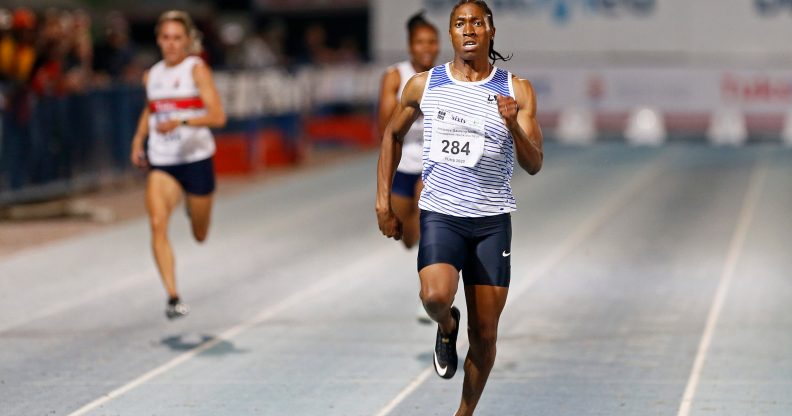Caster Semenya told she can’t defend her Olympic gold medal against lesser athletes unless she alters her natural hormone levels

South African 800 metre Olympic champion Caster Semenya. (PHILL MAGAKOE/AFP via Getty)
Caster Semenya lost her final appeal to compete in the 800 metres race at the postponed Toyko 2020 Olympics in a ruling by the Swiss Federal Supreme Court Tuesday (8 September).
After a lengthy battle, Semenya has been told that in order to compete in events between 400 metres and a mile, she must take hormones to reduce her natural testosterone levels – or else be considered illegible.
The South African middle-distance runner was, to Olympic book-keepers, a firm favourite to defend her 800m gold at next year’s rescheduled games.
But she saw her career thrown into disarray for something she had no control over – a rare genetic condition that elevates her testosterone levels.
Caster Semenya: ‘I will continue to fight for the human rights of female athletes’.
Tuesday’s ruling is in line with a rule change on testosterone levels in female athletes imposed by World Athletics, track’s top governing body, which was fortified by a 2019 court case.
In having her career nixed, Semenya said she is “disappointed”, the BBC reported.
“I refuse to let World Athletics drug me or stop me from being who I am,” she said.
“Excluding female athletes or endangering our health solely because of our natural abilities puts World Athletics on the wrong side of history.
“I will continue to fight for the human rights of female athletes, both on the track and off the track, until we can all run free the way we were born.
“I know what is right and will do all I can to protect basic human rights, for young girls everywhere.”

Caster Semenya (C) and her lawyer arrive for a landmark hearing at the Court of Arbitration for Sport. (HAROLD CUNNINGHAM/AFP via Getty Images)
World Athletics imposed hormone restrictions in women’s events from 400 metres to the mile. It has acknowledged they are discriminatory to intersex athletes and those with so-called “differences of sexual development” (DSD), but claims higher levels of natural testosterone give athletes a competitive advantage.
After the rules were introduced, seemingly in response to Semenya’s dominance in the 800m, she brought a case to the Swiss-based Court of Arbitration for Sport. The court ruled in favour of World Athletics and Semenya appealed, only to lose.
In March she suggested she might compete in the 200m, for which there are no hormonal restrictions. She won gold in the 800m in 2012 and 2016.
In a statement, World Athletics said: “For the last five years World Athletics has fought for and defended equal rights and opportunities for all women and girls in our sport today and in the future.
“We, therefore, welcome today’s decision by the Swiss Federal Tribunal to uphold our DSD regulations as a legitimate and proportionate means of protecting the right of all female athletes to participate in our sport on fair and meaningful terms.”
The Swiss Supreme Court said: “Fairness in sport is a legitimate concern and forms a central principle of sporting competition. It is one of the pillars on which competition is based.”

